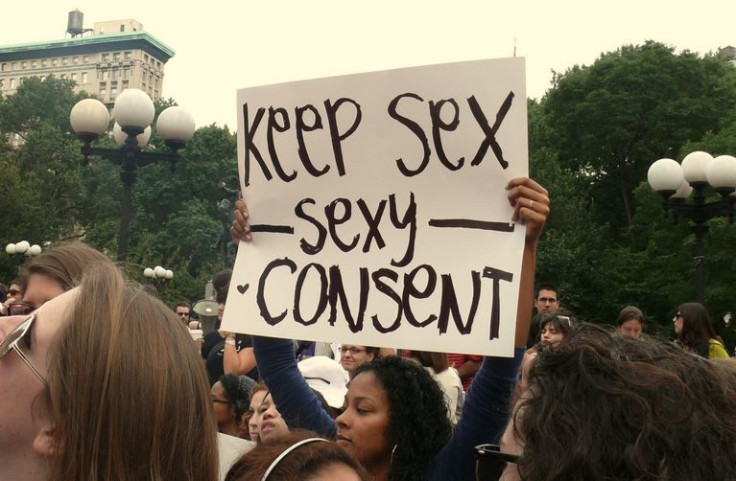California Sex Education Includes 'Yes Means Yes' Workshop, Teaches Students About Sexual Consent

The "Yes Means Yes" workshop being held on some college campuses, where incidence of rape continues to be a problem, has found its way to California high schools, The Daily Beast reports.
California was the first state to legally define affirmative sexual consent, defining the term as "affirmative, conscious, and voluntary agreement to engage in sexual activity." New York signed a similar law shortly after and now the two states are the only ones requiring affirmative sexual consent on campuses; California's now taking it a step further and adding it to sex education taught in high schools. Not only does the workshop include this definition, but it teaches students about the different forms of sexual harassment and violence. For example, peer health coordinator and senior health educator Justin Balido posed this scenario to freshmen at Carlmont High School in Belmont, Calif.:
A girl and boy meet at a school dance. The boy drives her home. They kiss. What happens next, over the girl’s protests, leaves him confused and her crying, no longer a virgin. Was the girl raped?
According to Medical Xpress, about a third of Balido's students think she was raped. Others think it was "something less," while most have more questions: Was the girl wearing something provocative? Did she try hard enough to stop it? What could the boy have done to make sure she was willing? When Balido asks another question himself, who is at fault in the scenario, many say the boy and others quietly say both.
These students have Balido to say "sexual assault or rape is the choice that the perpetrator makes, and it is never the victim's fault" — but what about other young students who go to college without opportunities for comprehensive education? The Daily Beast pointed to a recent episode of This American Life that aired this past May, titled "Birds & Bees," where Chana Joffe-Walt attends a workshop offered at SUNY Buffalo State.
First, Joffe-Walt found instead of mostly focusing on protecting women — think rape whistles and the buddy system — the workshop (taught by wellness and prevention coordinator Paula Madrigal) is designed to teach the things they can say when checking to make sure their partner is still consenting to what's happening and what they themselves are doing. But then she finds some students are struggling with the idea of consent.
One student asks if there should be a number of times he asks his partner if she's sure "because the reaffirmation of yes over and over again would kind of mess up the mood. Other questions include, "Does body language count as consent?" "What if she said yes before you got into the room, when you were both sober," and "How many beers is too much to have consent?"
Madrigal answered every question the same way: You always need consent. Even if you're a woman, even if you sleep with the same sex, even if you're in a relationship, and even if you're in the middle of having sex — consent can be withdrawn; it's active. Madrigal's workshop was supposed to be 45 minutes, but when Joffe-Walt was in attendance, it went over the hour mark. Students still had questions because it still didn't "sound right, It’s like you’re messing up the whole mood if you ask [for consent]."
Of course, there are those who don't think high school students should be receiving this kind of education.
"In the midst of this conversation, are the root causes being addressed? I would argue that they really aren't," Valerie Huber, president of Ascend, formerly called the National Abstinence Education Association, told Medical Xpress. "This discussion is getting reduced to a palliation rather than a solution."
The subject matter remains heavily debated, but as for simply talking to teens about sex, science shows it can lead to positive health outcomes. A recent JAMA study found "the sex talk" reduced risky behavior and increased teens' use of condoms and contraceptives. The Centers for Disease Control and Prevention reported despite the fact young people ages 15 to 24 account for a relatively small portion of those who are sexually active, they experienced the highest rates of chlamydia and gonorrhea in 2014.
And if parents don't talk to their kids about sex, they shouldn't expect their doctors to either: A 2013 JAMA study found doctors rarely discuss sexuality issues, and if they do, it's only for a short period of time. With rising STD rates among this young population, it's clear students need more knowledge on healthy sex behavior, which many argue includes consent.
"Sex ed stuff is a subject for skittishness among some, but we're talking about crimes here. We're talking about crime prevention," said senator Tim Kaine (D-Va). "We assume people just know good or bad behaviors because it's in the ether, but ... people need to be taught appropriate behaviors, what's right, what's wrong, what are lines you don't cross."



























